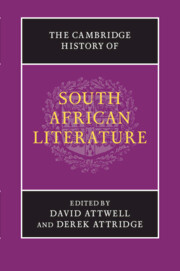Book contents
- Frontmatter
- Introduction
- PART I ORATURES, ORAL HISTORIES, ORIGINS
- PART II EXPLORATION, EARLY MODERNITY AND ENLIGHTENMENT AT THE CAPE, 1488–1820
- PART III EMPIRE, RESISTANCE AND NATIONAL BEGINNINGS, 1820–1910
- PART IV MODERNISM AND TRANSNATIONAL CULTURE, 1910–1948
- PART V APARTHEID AND ITS AFTERMATH, 1948 TO THE PRESENT
- PART VI SOUTH AFRICAN LITERATURE: CONTINUITIES AND CONTRASTS
- 33 South Africa in the global imaginary
- 34 Confession and autobiography
- 35 ‘A change of tongue’: questions of translation
- 36 Writing women
- 37 The experimental line in fiction
- 38 The book in South Africa
- 39 Literary and cultural criticism in South Africa
- Index
- References
37 - The experimental line in fiction
from PART VI - SOUTH AFRICAN LITERATURE: CONTINUITIES AND CONTRASTS
Published online by Cambridge University Press: 28 January 2012
- Frontmatter
- Introduction
- PART I ORATURES, ORAL HISTORIES, ORIGINS
- PART II EXPLORATION, EARLY MODERNITY AND ENLIGHTENMENT AT THE CAPE, 1488–1820
- PART III EMPIRE, RESISTANCE AND NATIONAL BEGINNINGS, 1820–1910
- PART IV MODERNISM AND TRANSNATIONAL CULTURE, 1910–1948
- PART V APARTHEID AND ITS AFTERMATH, 1948 TO THE PRESENT
- PART VI SOUTH AFRICAN LITERATURE: CONTINUITIES AND CONTRASTS
- 33 South Africa in the global imaginary
- 34 Confession and autobiography
- 35 ‘A change of tongue’: questions of translation
- 36 Writing women
- 37 The experimental line in fiction
- 38 The book in South Africa
- 39 Literary and cultural criticism in South Africa
- Index
- References
Summary
This chapter will consider what J. M. Coetzee has called ‘the experimental line’ within the works of black and white writers in English and Afrikaans, showing how, during the apartheid years, its playfulness and experimentalism was often passed over in critical accounts intent on identifying a literature of witness and solidarity. It will also trace the continuing ‘line’ of experimentation in post-apartheid literature.
‘What value does the experimental line in modern Western literature hold for Africa?’, asks Coetzee in ‘Alex La Guma and the Responsibilities of the South African Writer’ (p. 117), an essay first published in 1971. The question is prompted by Lewis Nkosi's 1966 essay, ‘Fiction by Black South Africans’, in which he argues that, ‘With the best will in the world it is impossible to detect in the fiction of black South Africans any significant and complex talent which responds with both the vigour of the imagination and sufficient technical resources to the problems posed by conditions in South Africa.’ ‘If black South African writers have read modern works of literature’, Nkosi states, name-checking Dostoevsky, Burroughs, Kafka and Joyce, ‘they seem to be totally unaware of its most compelling innovations’. ‘What we get most frequently,’ he argues, ‘is the journalistic fact parading outrageously as imaginative literature’ (p. 246).
- Type
- Chapter
- Information
- The Cambridge History of South African Literature , pp. 779 - 799Publisher: Cambridge University PressPrint publication year: 2012
References
- 3
- Cited by



